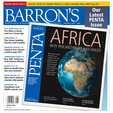 Anyone who remembers William Easterly‘s 2009 Pope Lecture at N.C. State University will find nothing surprising about the latest Barron’s cover story, in which Paul Theroux discusses the problems caused by various schemes to provide aid to Africa.
Anyone who remembers William Easterly‘s 2009 Pope Lecture at N.C. State University will find nothing surprising about the latest Barron’s cover story, in which Paul Theroux discusses the problems caused by various schemes to provide aid to Africa.
Never have so many people, so many agencies, so many stratagems, so much money been deployed to improve Africa — and yet the majority of the movers are part-timers, merely dropping in, setting up a scheme in the much-mocked “the-safari-that-does-good” manner, then returning to their real lives, as hard-charging businessmen, Hollywood actors, benevolent billionaires, atoning ex-politicians, MacArthur geniuses, or rock stars in funny hats. It’s not hard to imagine the future tombstones of the Clintons and Bono and Gates, and many others bitten by the eleemosynary itch, chiseled with the words, Telescopic Philanthropist. The farther away the donors are, the shorter their visits (“Chelsea Clinton took time out of her 10-day humanitarian trip in Africa to meet some of the kids that her AIDS work is benefiting…”), and the more passionate their feelings.
Never mind that Africa receives roughly $50 billion in aid annually from foreign governments, and perhaps $13 billion more from private philanthropic institutions, according to Penta’s estimate. Never mind that Angola’s oil revenues are around $72 billion, and Nigeria’s $95 billion; that Africa boasts at least 55 verified and somewhat detached billionaires. I can testify that Africa is much worse off than when I first went there 50 years ago to teach English: poorer, sicker, less educated, and more badly governed. It seems that much of the aid has made things worse.
I am not alone observing this fact. In his new book, The Great Escape: Health, Wealth, and the Origins of Inequality, economist Angus Deaton questions the usefulness of all aid, and describes how the greater proportion of the world’s poor are found not in Africa but in the booming, yet radically unequal, economies of China and India. Zambian-born economist Dambisa Moyo calls aid a “debilitating drug,” arguing that “real per-capita income [in Africa] today is lower than it was in the 1970s, and more than 50% of the population — over 350 million people — live on less than a dollar a day, a figure that has nearly doubled in two decades.” The Kenyan economist James Shikwati takes this same line on aid, famously telling the German magazine Der Spiegel, “For God’s sake, please stop.”


